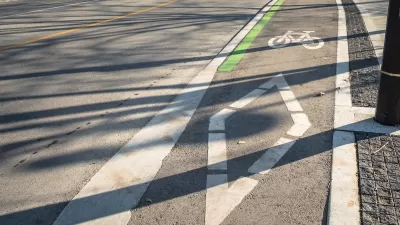In Washington D.C., Maryland, Virginia, North Carolina, and Alabama, the legal policy known as contributory negligence blocks cyclists from claiming damages if they're involved in a crash.

When it comes to cyclists sharing the road with cars, "most states abide by a policy of 'comparative fault' in the event of a crash. This standard holds that if a cyclist or pedestrian can claim less than 50 percent of responsibility for a dust-up, they're entitled to either a full insurance payment, or one commensurate with their level of negligence as determined by a jury."
However, as Eillie Anzilotti writes, "in Maryland, Virginia, North Carolina, Alabama, and Washington, D.C., that is not the case. That's because in those locales, the standard of contributory negligence has not been written out of the books, like it has been in the rest of the United States."
An anachronistic policy, contributory negligence states that if the victim is more than 1 percent responsible for an accident or injury, he or she cannot claim a recovery payment. Bruce Deming, a D.C.-area lawyer who often represents injured cyclists, say contributory negligence "originated in England in 1809 as a means to shield employers from having to compensate harmed members of their workforce." It has been repudiated by most U.S. jurists, and only remains on the books in four states and the capital.
In Washington, a measure to update the policy is having trouble getting through the city council "D.C.'s approach [...] would grant injured people the level of parity they're guaranteed in most of the rest of the country, and it shows the potential for contributory negligence to be struck down on a granular level in a way that the four other states could emulate."
FULL STORY: The Legal Policy That Makes Collisions Especially Harrowing for Cyclists

Montreal Mall to Become 6,000 Housing Units
Place Versailles will be transformed into a mixed-use complex over the next 25 years.

Planetizen Federal Action Tracker
A weekly monitor of how Trump’s orders and actions are impacting planners and planning in America.

DARTSpace Platform Streamlines Dallas TOD Application Process
The Dallas transit agency hopes a shorter permitting timeline will boost transit-oriented development around rail stations.

Tulsa Paid Remote Workers $10,000 to Move In — Nearly All of Them Stayed
The Tulsa Remote program generated more than $4 in local economic benefits for every dollar spent.

Chicago Transit: $770M Shortfall, 40% Service Cuts Loom
Despite dire warnings from transit officials, the Illinois General Assembly ended its legislative session without a solution.

Without International Immigrants, the Rural US Population Would Be Falling 58%
Census data shows that population growth in rural areas is due in large part to international migrants.
Urban Design for Planners 1: Software Tools
This six-course series explores essential urban design concepts using open source software and equips planners with the tools they need to participate fully in the urban design process.
Planning for Universal Design
Learn the tools for implementing Universal Design in planning regulations.
City of Mt Shasta
City of Camden Redevelopment Agency
City of Astoria
Transportation Research & Education Center (TREC) at Portland State University
City of Camden Redevelopment Agency
Municipality of Princeton (NJ)
Regional Transportation Commission of Southern Nevada




























